
This is a lesson hook for reading "The Cask of Amontillado"
- Subject:
- Literature
- Material Type:
- Activity/Lab
- Author:
- Natalie Krusemeier
- Date Added:
- 03/24/2021

This is a lesson hook for reading "The Cask of Amontillado"

This lesson provides teachers with support for using text-dependent questions to help students derive big ideas and key understandings while developing vocabulary using the modern fairytale, Cendrillon. In this Caribbean Cinderella story, Cendrillon is treated as a servant by her step-mother and half-sister. Nannin, the gogmother, uses a magic wand to ready Cendrillon for a ball, where Cendrillon meets a rich man's son, Paul, who falls in love with her and finds her when she is lost to him.

Young Jose Mendez is a terrific centerfielder but a weak hitter. Jose wants his father to be proud of him. When his father calls him a "Born Outfielder," Jose realizes that his father is proud of his abilities on and off the field.

The course facilitates a close reading of Don Quixote in the artistic and historical context of renaissance and baroque Spain. Students are also expected to read four of Cervantes' Exemplary Stories, Cervantes' Don Quixote: A Casebook, and J.H. Elliott's Imperial Spain. Cervantes' work will be discussed in relation to paintings by Velzquez. The question of why Don Quixote is read today will be addressed throughout the course. Students are expected to know the book, the background readings and the materials covered in the lectures and class discussions.
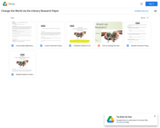
“Change the World via The Literary Research Paper” is a course framework for composition. This course framework incorporates a semester-long group project that empowers students to make connections and choices to leverage Literature research to make changes in their community. It also provides learners with the opportunity to explore their interests and apply research from literature, social issues, non-profit organizations, or civic groups.

This chapter will focus on the family, telling ages and phones numbers covering numbers from 30 - 1.000.000; it will reintroduce the verb "avoir" to have. Making interrogatory questions will also be covered with "qui", "que, "comment", "quand" etc. It will also revisit possessive adjectives for use with family members.
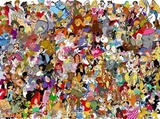
This lesson is designed for a sixth or seventh-grade English Language Arts class; however, can be used in other classes where character analysis is necessary such as a drama class, history class, etc. Learners will work through a series of tasks incorporating text, pictures, and videos to define character analysis, compare and contrast direct and indirect characteristics, describe character traits using direct characterization, and analyze characters using indirect characterization. This lesson can be tailored to fit individual students’ interests and hobbies by changing the pictures they are describing in the introduction activity. The resources used to create this lesson are a hybrid of resources—online videos are used to capture the learners’ attention and interests and a Word document with a chart identifying direct and indirect characteristics that will need to be printed out for each student and a piece of paper will be necessary for students to complete the first activity as well. Students will also have extra practice with analyzing characters by completing the activity in the “Challenge Yourself” section. This section ensures that students are transferring their learning of character analysis from video to literature selections.
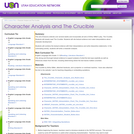
This set of lessons extends over several weeks and incorporates all acts of Arthur Miller's play, The Crucible. Students will closely read The Crucible. Students will cite textual evidence and make interpretations about character development. Students will combine the textual evidence with their interpretations and write interpretive statements. In the culminating activity, students will write a character analysis.

This discusses the character development of Robert Walton, Victor Frankenstein, and the creature within the novel Frankenstein. It uses quotes from the text to create a basis for each amount of development.

This lesson contains an instruction video and assessment in Google docs on characterization in literature. It can be used with any literary text.
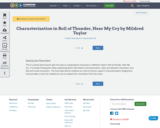
This is a stand alone lesson plan focused on analyzing the characters in Mildred Taylor's Roll of Thunder, Hear My Cry. It includes Powerpoint slides explaining direct and indirect characterization, static and dynamic characters, and flat and round characters. The final slide directs students to a link to Sharon Layton's Characterization Assignment that provides a chart for students to use to analyze four characters from the novel.

This adaptation of Charles Dickens' A Christmas Carol is written as a graded reader for ESL/EFL/ELT purposes. The text is estimated to be at the INTERMEDIATE level on the Extensive Reading Foundation Grading Scale, or A2 on the CEFR scale. (PDF, epub, mobi)

Using the landmark feminist short story "The Yellow Wall-paper," students will employ close reading concepts to analyze setting, narrative style, symbol, and characterization.
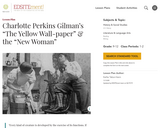
Charlotte Perkins Gilman's story "The Yellow Wall-paper" was written during atime of change. This lesson plan, the first part of a two-part lesson, helps to set the historical, social, cultural, and economic context of Gilman's story.

This lesson provides teachers with support for using text-dependent questions to help students derive big ideas and key understandings while developing vocabulary using the children's novel, Charlotte's Web. A story of friendship and loyalty between Wilbur, a spring pic and a grey spider named Charlotte. Wilbur learns that he is being fattened for slaughter in the fall. Wilbur is at first disgusted by the fact that charlotte eats flies, but comes to both appreciate and love her.
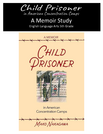
Japanese American Memorial Pilgrimages has developed lessons, supplemental resources, and educational documentary videos to accompany the memoir Child Prisoner in American Concentration Camps by Mako Nakagawa.

This course studies the transformation of childhood and youth since the 18th century in France and the development of sentimentality within the family in a francophone context. We will examine the personification of children as a source of inspiration for artistic creation and a political ideal aimed at protecting future generations, and consider various representations of childhood and youth in literature, movies, and songs.
The course is taught entirely in French.
About the instructor: Bruno Perreau is the Cynthia L. Reed Professor of French Studies at MIT and Director of MIT’s Center of Excellence in French Studies. He is also an Affiliate Faculty at the Center for European Studies, Harvard University.
Perreau recently published The Politics of Adoption: Gender and the Making of French Citizenship (MIT Press, 2014), Queer Theory: The French Response (Stanford University Press, 2016), Les Défis de la République (ed. with Joan W. Scott, Presses de Sciences Po, 2017), Qui a peur de la théorie queer ? (Presses de Sciences Po, 2018), and Sphères d’injustice. Pour un universalisme minoritaire (La Découverte, 2023).

This course studies the transformation of childhood and youth since the 18th century in France, as well as the development of sentimentality within the family in a francophone context. Students will examine the personification of children, both as a source of inspiration for artistic creation and a political ideal aimed at protecting future generations, and consider various representations of childhood and youth in literature (e.g., Pagnol, Proust, Sarraute, Lave, Morgievre), movies (e.g., Truffaut), and songs (e.g., Brel, Barbara). This course is taught entirely in French.
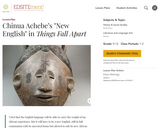
This lesson provides a Common Core application for high school students for Chinua Achebe's novel Things Fall Apart. Students will undertake close reading of passages in Things Fall Apart to evaluate the impact of Achebe's literary techniques, the cultural significance of the work, and how this international text serves as a lens to discover the experiences of others.

Nigerian born Chinua Achebe is one of the world's most well-known and influential contemporary writers. His first novel, Things Fall Apart (1958), is an early narrative about the European colonization of Africa told from the point of view of the colonized people.